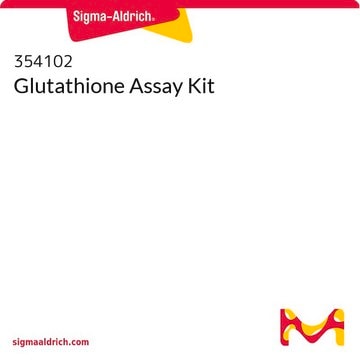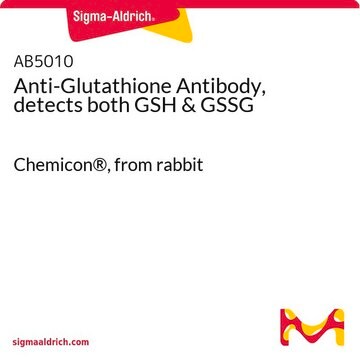CS0260
Glutathione Assay Kit
sufficient for 700 assays
Synonyme(s) :
GSH Quantification Test
Se connecterpour consulter vos tarifs contractuels et ceux de votre entreprise/organisme
About This Item
Code UNSPSC :
12161503
Nomenclature NACRES :
NA.84
Produits recommandés
Description générale
The kit provides all reagents for simple and quick assay to measure the level of total glutathione (GSSG + GSH) in a cell and tissue extracts and in red blood cells or plasma. The sample is first deproteinized with the 5% 5-sulfosalicylic acid solution. Glutathione content of the sample is then assayed using a kinetic assay in which catalytic amounts of glutathione cause a continuous reduction of 5,5′-dithiobis-(2-nitrobenzoic) acid (DTNB) to TNB. The oxidised glutathione formed is recycled by glutathione reductase and NADPH. The product, TNB, is assayed colorimetrically at 412 nm.
Application
Glutathione Assay Kit has been used to measure total glutathione concentration in glutathione assay. It also has been used to determine different oxidative stress parameters in rats.
Actions biochimiques/physiologiques
Glutathione (GSH) functions as a cofactor for several antioxidant enzymes. It is involved in the regeneration of vitamins C and E. It modulates cellular proliferation and apoptosis. GSH is crucial for mitochondrial functioning and the maintenance of mitochondrial DNA (mtDNA). Mutations in this gene are associated with Alzheimer′s, Parkinson′s and Huntington′s diseases. It is also linked to cystic fibrosis, immune diseases and cardiovascular diseases.
Reduced glutathione (GSH), a tripeptide (g-glutamyl-cysteinylglycine), is the major free thiol in most living cells and is involved in many biological processes such as detoxification of xenobiotics, removal of hydroperoxides, and maintenance of the oxidation state of protein sulfhydryls. It is the key antioxidant in animal tissues
Caractéristiques et avantages
- A quick and simple method
- The kit contains all the reagents required for a colorimetric assay of total glutathione (oxidised + reduced GSSG + GSH)
- The kit includes a deproteination reagent for biological samples
Composants de kit seuls
Réf. du produit
Description
- Assay Buffer 5x 30 mL
- DTNB 8 mg
- DMSO 7.5 mL
- Glutathine Reductase 20 U
- L-Glutathione Reduced 300 μg
- NADPH 25 mg
- 5-Sulfosalicylic Acid 2.5 g
Produit(s) apparenté(s)
Réf. du produit
Description
Tarif
Mention d'avertissement
Danger
Mentions de danger
Classification des risques
Eye Dam. 1 - Resp. Sens. 1 - Skin Corr. 1B
Code de la classe de stockage
8A - Combustible corrosive hazardous materials
Point d'éclair (°F)
188.6 °F
Point d'éclair (°C)
87 °C
Certificats d'analyse (COA)
Recherchez un Certificats d'analyse (COA) en saisissant le numéro de lot du produit. Les numéros de lot figurent sur l'étiquette du produit après les mots "Lot" ou "Batch".
Déjà en possession de ce produit ?
Retrouvez la documentation relative aux produits que vous avez récemment achetés dans la Bibliothèque de documents.
Les clients ont également consulté
Genotoxicity of hydroquinone in A549 cells
Peng C, et al.
Cell Biology and Toxicology, 29(4), 213-227 (2013)
Rat testicular impairment induced by electromagnetic radiation from a conventional cellular telephone and the protective effects of the antioxidants vitamins C and E
Al-Damegh MA
Clinics, 67(7), 785-792 (2012)
Assay of glutathione, glutathione disulfide, and glutathione mixed disulfides in biological samples.
T P Akerboom et al.
Methods in enzymology, 77, 373-382 (1981-01-01)
Maria Swastika et al.
Malaria journal, 19(1), 208-208 (2020-06-20)
Glucose-6-phosphate dehydrogenase (G6PD) deficiency is the most common enzyme disorder in the world. Its main function is to generate NADPH that is required for anti-oxidative pathway in the cells especially in red blood cells (RBC). G6PD deficiency is X-linked and
Nicol M Caplin et al.
Frontiers in plant science, 11, 389-389 (2020-05-01)
The effects of ionising radiation (IR) on plants are important for environmental protection but also in agriculture, horticulture, space science, and plant stress biology. Much current understanding of the effects of IR on plants derives from acute high-dose studies but
Notre équipe de scientifiques dispose d'une expérience dans tous les secteurs de la recherche, notamment en sciences de la vie, science des matériaux, synthèse chimique, chromatographie, analyse et dans de nombreux autres domaines..
Contacter notre Service technique





